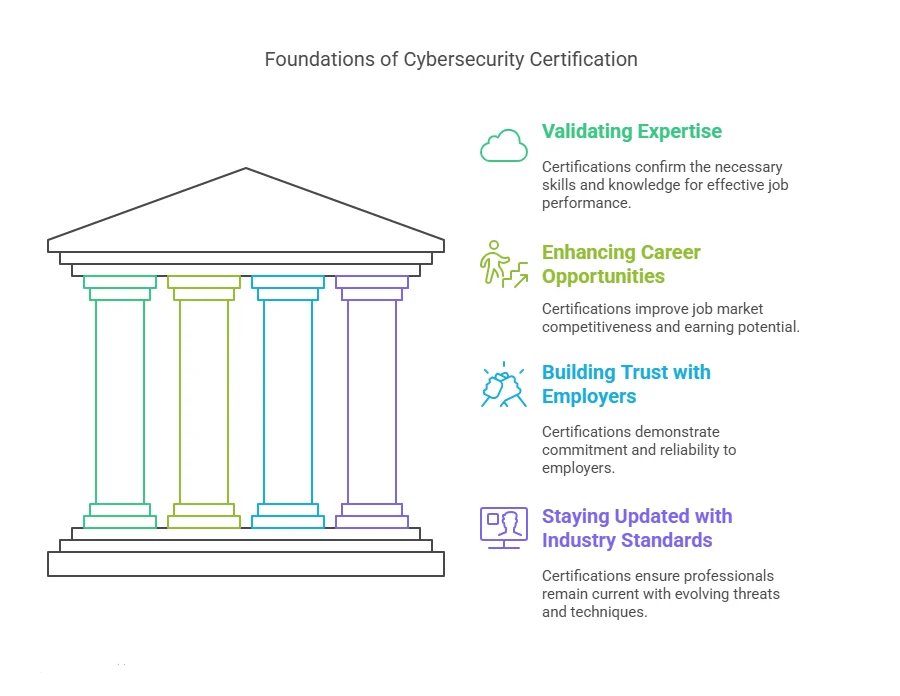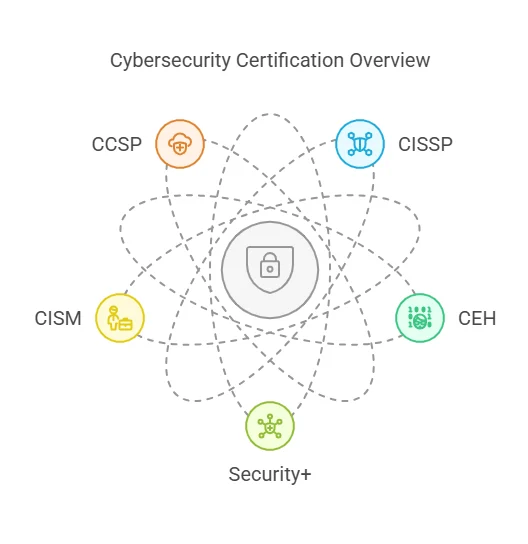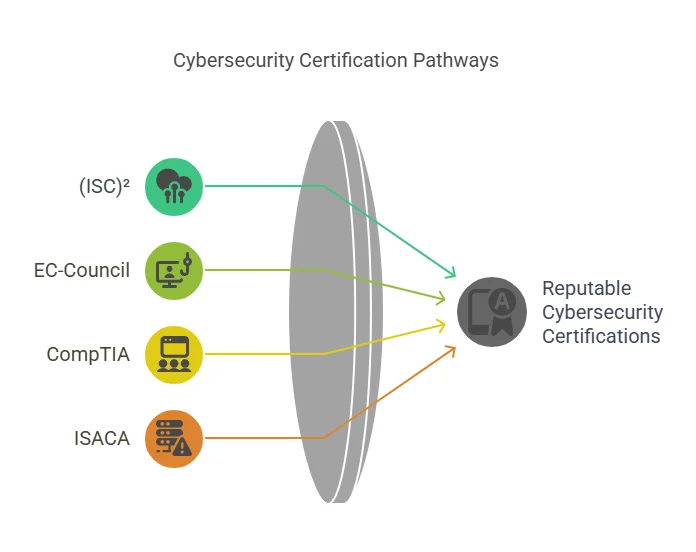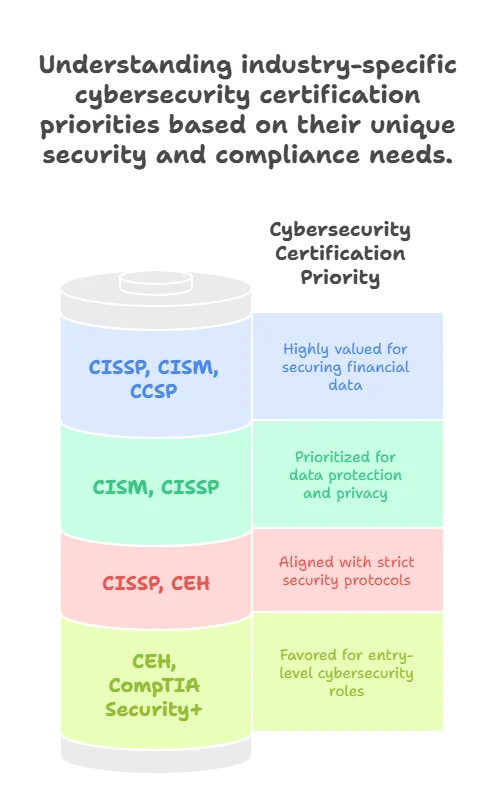Cybersecurity is more critical than ever, with businesses and organizations around the world facing increasing threats from hackers, cybercriminals, and other malicious actors. To safeguard valuable data, systems, and networks, organizations require highly trained professionals who are equipped with the latest skills and knowledge. One of the best ways to demonstrate expertise and prove competency in this rapidly evolving field is through cybersecurity certifications. In this article, we’ll discuss some of the top cybersecurity certifications, the certification bodies offering them, their relevance in various industries, and their validity.
Overview of Cyber Security Certifications
Cybersecurity certifications are credentials awarded to individuals who have demonstrated proficiency in specific areas of information security and cybersecurity through examinations, hands-on experience, or a combination of both. These certifications are often awarded by professional organizations or industry-recognized bodies. They validate the skills and knowledge needed to secure data, protect networks, and respond to cyber threats.
Related Blog: Top Cyber Security Certifications
Why Cybersecurity Certifications Are Important
Certifications are essential in cybersecurity because they:
- Validate expertise: They show that a professional has the necessary skills and knowledge to perform their job effectively.
- Enhance career opportunities: Certified professionals are often more competitive in the job market and have higher earning potential.
- Build trust with employers: Employers value certifications as they demonstrate that an individual has a proven commitment to cybersecurity.
- Stay updated with industry standards: Cybersecurity is an ever-evolving field, and certifications ensure professionals stay updated with the latest threats, tools, and techniques.

Top Certifications List
Several cybersecurity certifications are widely recognized and respected in the industry. These certifications are essential for anyone looking to excel in the cybersecurity field. Below are some of the most prestigious certifications available:
Certified Information Systems Security Professional (CISSP)
- Overview: CISSP is one of the most well-known and respected cybersecurity certifications. It is designed for professionals in the field of information security, such as security analysts, IT managers, and security consultants.
- Skills Covered: Security and risk management, asset security, security architecture, and software development security.
- Prerequisite: At least five years of work experience in information security.
Certified Ethical Hacker (CEH)
- Overview: The CEH certification is focused on ethical hacking techniques, including penetration testing and vulnerability assessment. It is suitable for individuals who want to become experts in identifying and addressing potential threats in networks and systems.
- Skills Covered: Footprinting, scanning, hacking, and securing systems against vulnerabilities.
- Prerequisite: Two years of work experience in the information security domain (or completion of EC-Council’s official training).
CompTIA Security+
- Overview: Security+ is an entry-level certification that provides a foundational understanding of cybersecurity concepts, ideal for beginners or those transitioning to cybersecurity roles.
- Skills Covered: Network security, compliance, operational security, threats, and vulnerabilities.
- Prerequisite: None (although basic knowledge of IT and networking is helpful).
Certified Information Security Manager (CISM)
- Overview: CISM is geared towards individuals who focus on managing and governing information security programs. It is especially useful for IT professionals aiming for leadership roles.
- Skills Covered: Information risk management, governance, and incident response.
- Prerequisite: At least five years of work experience in information security management.
Certified Cloud Security Professional (CCSP)
- Overview: As more businesses move to the cloud, cloud security has become a crucial area in cybersecurity. CCSP is designed for professionals who want to specialize in cloud security.
- Skills Covered: Cloud architecture, governance, risk management, and cloud security operations.
- Prerequisite: At least five years of cumulative work experience in information technology, with three years in cloud security.
Related Blog: How to Choose the Right Cyber Security Certification

Certification Bodies
The following organizations are well-regarded in the cybersecurity industry for offering reputable certifications:
(ISC)²
- Notable certifications: CISSP, CCSP
- Overview: The International Information System Security Certification Consortium (ISC)² is a leading global nonprofit organization that provides certifications in the field of information security.
EC-Council
- Notable certifications: CEH, EC-Council Certified Security Analyst (ECSA)
- Overview: The EC-Council is a global leader in cybersecurity certifications and is well-known for providing practical and ethical hacking certifications.
CompTIA
- Notable certifications: CompTIA Security+, CompTIA Cybersecurity Analyst (CySA+)
- Overview: CompTIA is a leading provider of IT certifications, and its cybersecurity certifications, such as Security+, are recognized worldwide.
ISACA
- Notable certifications: CISM, Certified in Risk and Information Systems Control (CRISC)
- Overview: ISACA is a nonprofit professional association for IT governance, risk management, and cybersecurity professionals. It offers certifications in information security and IT audit.

Industry Relevance
Different industries place emphasis on different cybersecurity certifications depending on their unique needs:
- Finance: Certifications like CISSP, CISM, and CCSP are highly valued in the finance sector due to the need for securing financial data and complying with regulations.
- Healthcare: Healthcare organizations often prioritize certifications related to data protection and privacy, such as CISM and CISSP, as they must comply with regulations like HIPAA (Health Insurance Portability and Accountability Act).
- Government: Government agencies look for cybersecurity professionals with certifications such as CISSP and CEH, as these align with their strict security protocols.
- Tech and Consulting: In the tech and consulting industries, certifications like CEH and CompTIA Security+ are highly sought after, especially for entry-level roles in cybersecurity.

Market Demand
Cybersecurity professionals are in high demand across various industries due to the increasing threat landscape. The Bureau of Labor Statistics predicts that employment in information security will grow by 35% from 2021 to 2031, much faster than the average for all occupations.
Professionals holding cybersecurity certifications have a competitive edge in the job market, as they demonstrate expertise and a commitment to staying updated on the latest security trends and technologies.
Certification Validity
Most cybersecurity certifications have a validity period, typically ranging from 3 to 5 years. After this period, certification holders are required to renew their credentials, which often involves continuing education, attending industry conferences, or retaking exams.
For example:
- CISSP: Requires 120 Continuing Professional Education (CPE) credits every three years.
- CEH: Needs to be renewed every three years with 120 hours of continuing education.
Related Blog: Benefits of Cyber Security Certifications
Conclusion
Cybersecurity certifications play an essential role in validating the skills and knowledge of professionals in the cybersecurity field. They help individuals stay competitive in the job market and ensure that organizations are protected against emerging cyber threats. As the field continues to evolve, the demand for certified cybersecurity professionals is only expected to increase.
If you’re looking to advance your career in cybersecurity, obtaining certifications like CISSP, CEH, or CompTIA Security+ can significantly improve your job prospects and earning potential. At ACSMI, we provide training and certifications in medical scribing and other related fields. Stay ahead of the curve with our expert certifications and elevate your career today!
FAQs
What is the most recognized cybersecurity certification?
CISSP is often considered the gold standard for cybersecurity certifications.
How long does it take to become certified in cybersecurity?
It varies depending on the certification. For instance, Security+ can be earned within a few months, while CISSP typically requires more experience.
Are there any prerequisites for cybersecurity certifications?
Yes, some certifications require prior work experience in the field, while others can be pursued with foundational knowledge in IT or cybersecurity.
How much do cybersecurity certifications cost?
Costs vary widely depending on the certification, ranging from a few hundred to several thousand dollars.
Do I need to renew my cybersecurity certification?
Yes, most certifications require periodic renewal, which may include completing continuing education requirements or retaking exams.

Leave a Reply